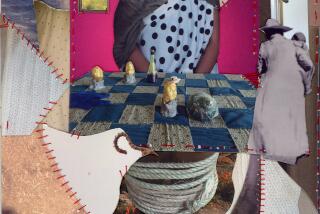BOOK REVIEW / PERSONAL GROWTH : Lenses and Metaphors That Focus on the Meaning of Life : PERIPHERAL VISION: Learning Along the Way <i> by Mary Catherine Bateson</i> ; HarperCollins $23, 243 pages
- Share via
“Is it a book about optometry?” someone asked me, looking at the cover, which features an eye with a psychedelic spiral coming out of it and a spirograph design in the background. No. It is not a book about optometry. It is about everything but optometry, though I feel certain that optometrists could find something in here to talk about.
“This is a book of stories and reflections strung together to suggest a style of learning from experience,” Mary Catherine Bateson writes in her gentle, self-effacing way. Someone with more hubris might say that it describes a way to suck the most out of life, to broaden one’s vision and experience, to raise children better equipped to live in a changing world, and to not feel so bad if your resume looks like Scarlett O’Hara’s dance card.
Many of the ideas here are reminiscent of Bateson’s last book, “Composing a Life,” a book I am not alone in recommending to everyone who thinks that life should be a straight line moving in a recognizable direction. In that book, Bateson makes the argument, among others, that in some ways women have a better deal than men because traditionally they view their lives as a series of stages and phases, and are encouraged to do so by the physiological fact of child-bearing as well as the vagaries of the job market.
This book starts with the same idea--that life is something we piece together--but goes deeper, using several metaphors that describe the ways we can learn from experience.
The first and most central metaphor is peripheral vision: “Sometimes change is directly visible, but sometimes it is apparent only to peripheral vision, altering the meaning of the foreground.” Narrowly focused attention, doing one thing at a time and specialization of tasks and careers (luxuries all prized in our society and traditionally granted mostly to men) limits our learning and our ability and inclination to live responsibly.
Another metaphor is “spiral learning”: “What we call the familiar is built up in layers to a structure known so deeply that it is taken for granted and virtually impossible to observe without the help of contrast. Encountering familiar issues in a strange setting is like returning on a second circuit of a Mobius strip and coming to the experience from the opposite side.” Yet another is the concept of Gaea, in which the earth is seen as a living organism; this is not Bateson’s own creation, but a metaphor she uses to describe our dependence on and connections to the environment and other cultures.
Bateson has had plenty of opportunity to fine-tune her ability to learn from other cultures. Her parents, anthropologists Margaret Mead and Gregory Bateson, provided a rich childhood, much of it in Israel. As an adult, Bateson has lived in Israel, Iran and the Philippines, and “Peripheral Vision” is full of stories set in Persian gardens and Philippine villages, peopled with Tibetan monks and Quakers and students in Tehran.
Oddly enough the book was written, Bateson tells us, at the MacDowell Colony, an isolated haven for artists and writers in New Hampshire. Her little studio is full of objects from her travels that prompt her memory and give a physical structure, like a double helix, to her ideas.
She has learned an enormous amount of very useful, daily-life information from the cultures she has lived in and studied. From an interview with a Japanese woman (part of a World War II study of Japanese culture): “We practice respect for the father . . . in case we someday find someone who deserves that respect.” In Iran, the phrase halalet basheh, “let it be permitted to you,” proves useful for granting an additional (if not the full amount illegally demanded) payment to wily cabdrivers. I fully intend to incorporate what she reports as the Quaker response to a difference of opinion: “Friend, it would never have occurred to me that way.”
And this statement could arguably beat the Golden Rule for elegance: “Real help,” Bateson writes, “does not treat need as the result of irresponsibility or malingering and is generous enough to make it possible to contribute in turn.”
How can we help others, including our children, learn the most from their experiences? Offer “early and often the experience of difference,” Bateson suggests, and “the experience of making and looking at art, which demonstrates that two people can look at the same mountain and see something different.”
“Recognizing that the self is not identical through time,” she concludes, “is a first step in celebrating it as fluid and variable, shaped and reshaped by learning.”
More to Read
Sign up for our Book Club newsletter
Get the latest news, events and more from the Los Angeles Times Book Club, and help us get L.A. reading and talking.
You may occasionally receive promotional content from the Los Angeles Times.










